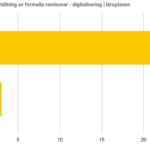
Kritikvåg mot läroplansutredningens digitala förslag
juni 25, 2025
Näringslivets perspektiv: “Lärande är en strategisk affärsfråga”
oktober 7, 2025
Sweden has just seen the rise of its first AI unicorn in edtech. Sana, an AI-native learning and knowledge management platform, has been valued at over one billion dollars and acquired by U.S. HR-tech giant Workday.
Workday is a global player in cloud-based enterprise applications, serving thousands of companies worldwide with solutions for HR, finance, and workforce management. Sana, founded in Stockholm, building AI-driven learning and knowledge agents for companies and organisations.
What this means for L&D and the wider market
The acquisition signals a shift in how AI will become embedded in enterprise platforms, not as an add-on, but as a core function. To better understand what this might mean from the customer side, we spoke with Teemu Lilja, Head of Telia Tech Academy.
According to Teemu, the industry’s initial reaction was “a mix of excitement and curiosity.” He explains: “Most see it as a bold move that signals a shift: AI-native tools are no longer ‘add-ons,’ they’re becoming core to how enterprise systems are designed. From what I understand from their announcement and reflections from industry experts, the plan is to make Workday the ‘front door for work,’ where knowledge, and learning come together. That resonates strongly, but it also raises questions about how quickly organisations can adapt their processes and data quality to fully leverage this.”
This raises the bar for competence platforms
When it comes to how Sana’s positioning within AI-driven learning and knowledge management may shape competence platforms, Lilja sees the acquisition as a significant leap forward. “This raises the bar through the roof. If a platform like Sana can tap into the company’s full knowledge base and combine that with your context; your role, responsibilities, deliverables, development plans, and performance goals… then it’s not just supporting learning, it’s intentionally supporting you in work performance and personal growth at the same time. The differentiator won’t just be features, it will be the depth and quality of the data the platform can access. That’s what will decide who really delivers value.”
The implications for Learning & Development (L&D) and the broader market are equally profound. As Lilja points out: “For L&D, this forces us to mature as a function. We’ll need to move into truly data-driven conversations and make decisions and build solutions with much more intention and precision. With AI agents automate and democratize analysis, learning design, content creation, curation, and other processes, our role shifts from delivering training to architecting systems that enables learning and drive performance. On the wider market, this raises the competitive pressure. Smaller players will need to specialize, innovate or integrate, while large platforms that combine rich data with AI capabilities will set the new standard.”
From Stockholm Startup to AI Unicorn
With Workday’s acquisition of Sana, Sweden has placed itself firmly on the global edtech map. It underscores Swedish innovation capacity in AI and learning technologies. The deal demonstrates how homegrown companies can shape global markets and signals that the future of enterprise learning may well be written in Sweden. So continue to support and invest in Swedish and European edtech solutions, ensuring that innovation and competitiveness close to the needs of our own societies.
